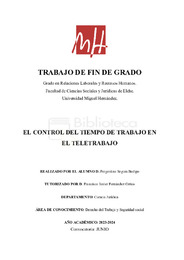Por favor, use este identificador para citar o enlazar este ítem:
https://hdl.handle.net/11000/33237Registro completo de metadatos
| Campo DC | Valor | Lengua/Idioma |
|---|---|---|
| dc.contributor.advisor | Fernández Orrico, Fco. Javier | - |
| dc.contributor.author | Segura Bodipo, Pergentino | - |
| dc.contributor.other | Departamentos de la UMH::Ciencia Jurídica | es_ES |
| dc.date.accessioned | 2024-09-19T11:57:06Z | - |
| dc.date.available | 2024-09-19T11:57:06Z | - |
| dc.date.created | 2024-06 | - |
| dc.identifier.uri | https://hdl.handle.net/11000/33237 | - |
| dc.description.abstract | El presente Trabajo de Fin de Grado aborda el tema del control del tiempo de trabajo en el teletrabajo, una modalidad laboral que ha cobrado gran relevancia debido a la pandemia de COVID-19. Se analiza la normativa vigente en España, desde los antecedentes hasta la legislación actual, incluyendo el Real Decreto-ley 28/2020 y la Ley 10/2021. Además, se examinan las ventajas y desventajas del teletrabajo, así como su impacto en la productividad y el bienestar de los trabajadores. El estudio también se centra en la desconexión digital y los riesgos psicosociales asociados al teletrabajo, proponiendo estrategias para una gestión efectiva del tiempo y un equilibrio saludable entre la vida laboral y personal. | es_ES |
| dc.description.abstract | This Final Degree Project studies the control of working hours in teleworking, a labor modality that has gained significant importance due to the COVID-19 pandemic. The current regulations in Spain are analyzed, from the antecedents to the current legislation, including Real Decreto-ley 28/2020 and Ley 10/2021 Additionally, the advantages and disadvantages of teleworking are examined, as well as its impact on productivity and workers' well-being. The study also focuses on digital disconnection and the psychosocial risks associated with teleworking, proposing strategies for effective time management and a healthy balance between work and personal life. | es_ES |
| dc.format | application/pdf | es_ES |
| dc.format.extent | 38 | es_ES |
| dc.language.iso | spa | es_ES |
| dc.publisher | Universidad Miguel Hernández de Elche | es_ES |
| dc.rights | info:eu-repo/semantics/openAccess | es_ES |
| dc.rights | Attribution-NonCommercial-NoDerivatives 4.0 Internacional | * |
| dc.rights.uri | http://creativecommons.org/licenses/by-nc-nd/4.0/ | * |
| dc.subject | Teletrabajo | es_ES |
| dc.subject | Registro de Jornada | es_ES |
| dc.subject | Control del Tiempo | es_ES |
| dc.subject | Desconexión Digital | es_ES |
| dc.subject | Telework | es_ES |
| dc.subject | Control working hours, | es_ES |
| dc.subject | Time Control | es_ES |
| dc.subject | Digital Disconnection | es_ES |
| dc.subject.other | CDU::6 - Ciencias aplicadas::65 - Gestión y organización. Administración y dirección de empresas. Publicidad. Relaciones públicas. Medios de comunicación de masas | es_ES |
| dc.title | El control del tiempo de trabajo en el teletrabajo | es_ES |
| dc.type | info:eu-repo/semantics/bachelorThesis | es_ES |

Ver/Abrir:
Pergentino_Bodipo_Y5676417P.docx.pdf
637,35 kB
Adobe PDF
Compartir:
 La licencia se describe como: Atribución-NonComercial-NoDerivada 4.0 Internacional.
La licencia se describe como: Atribución-NonComercial-NoDerivada 4.0 Internacional.
.png)